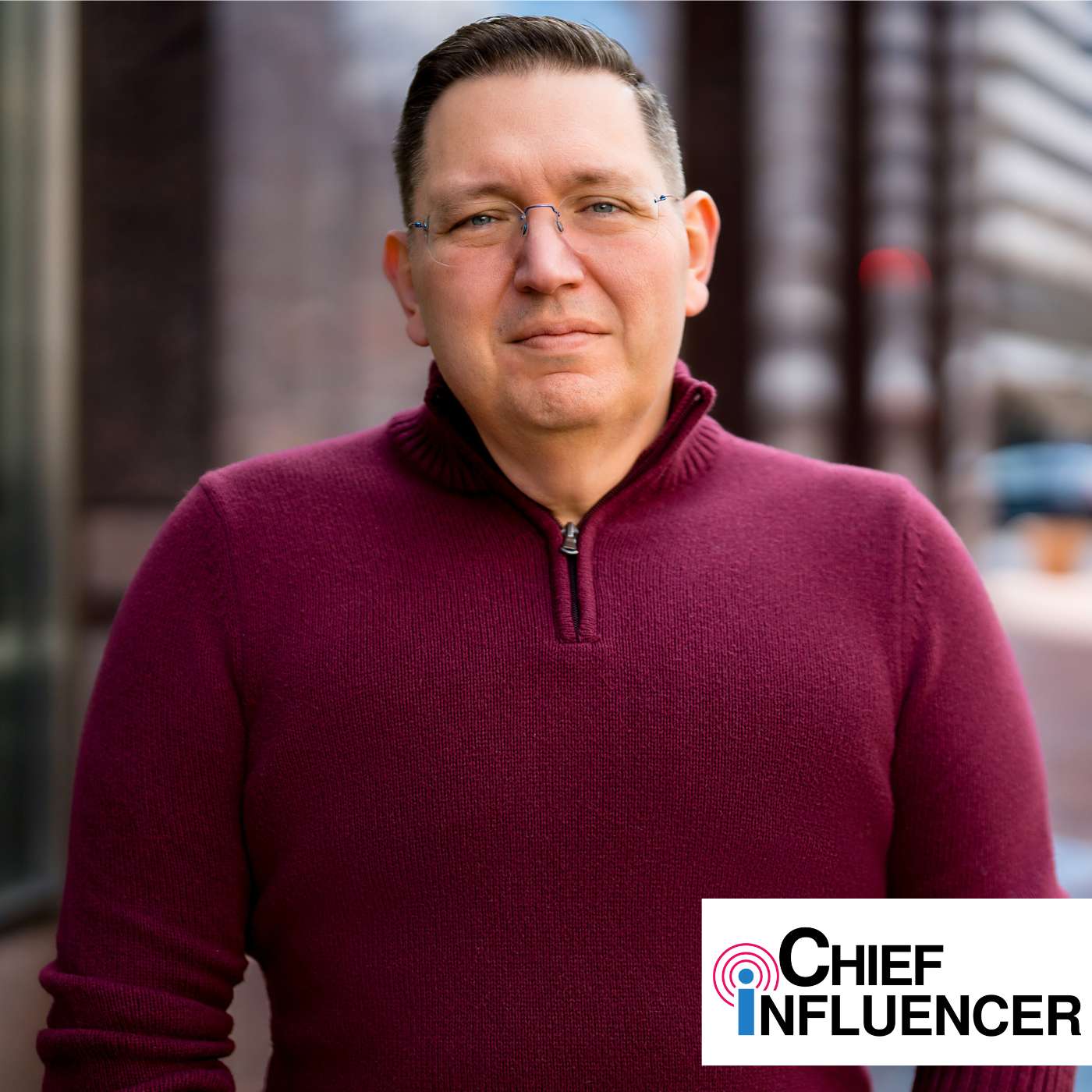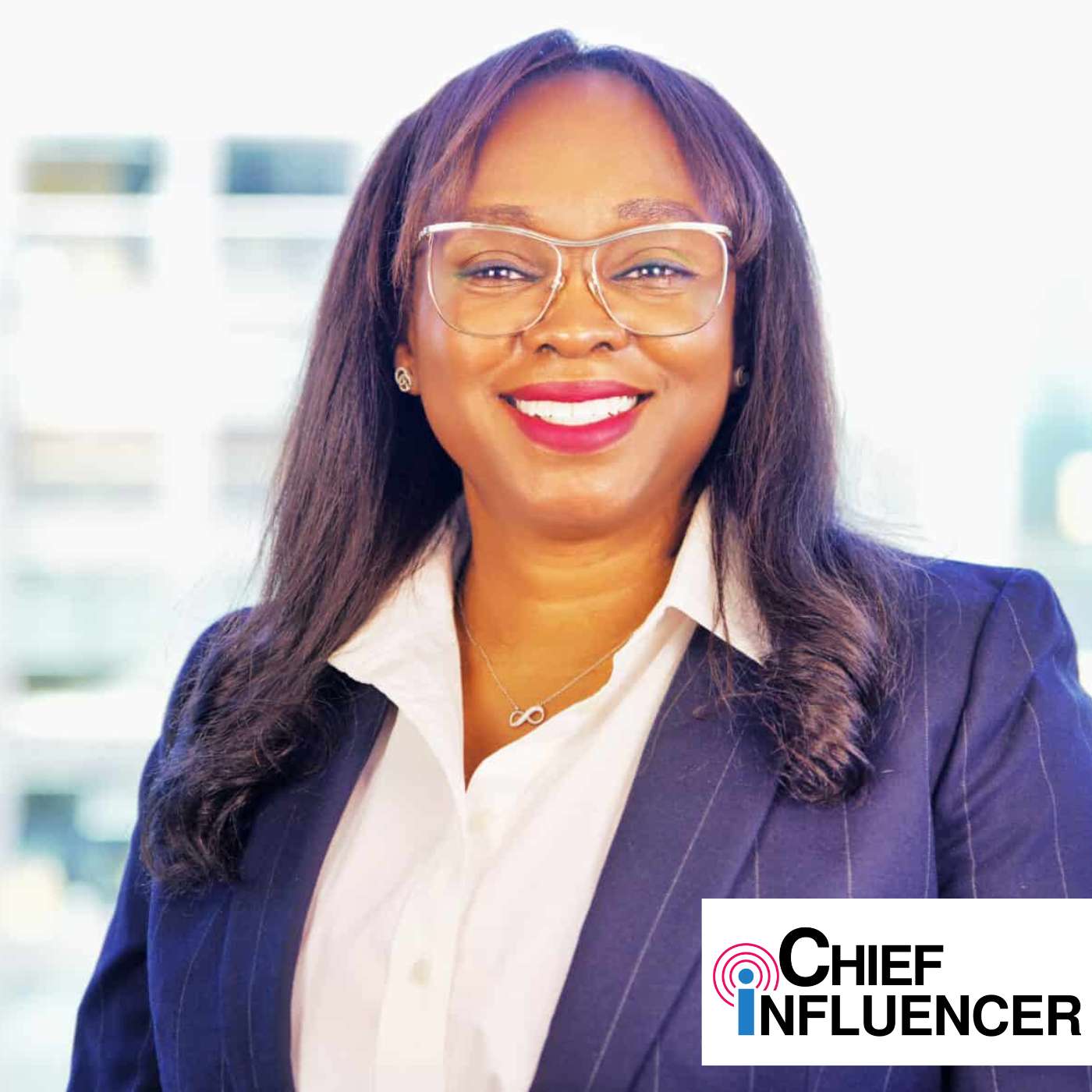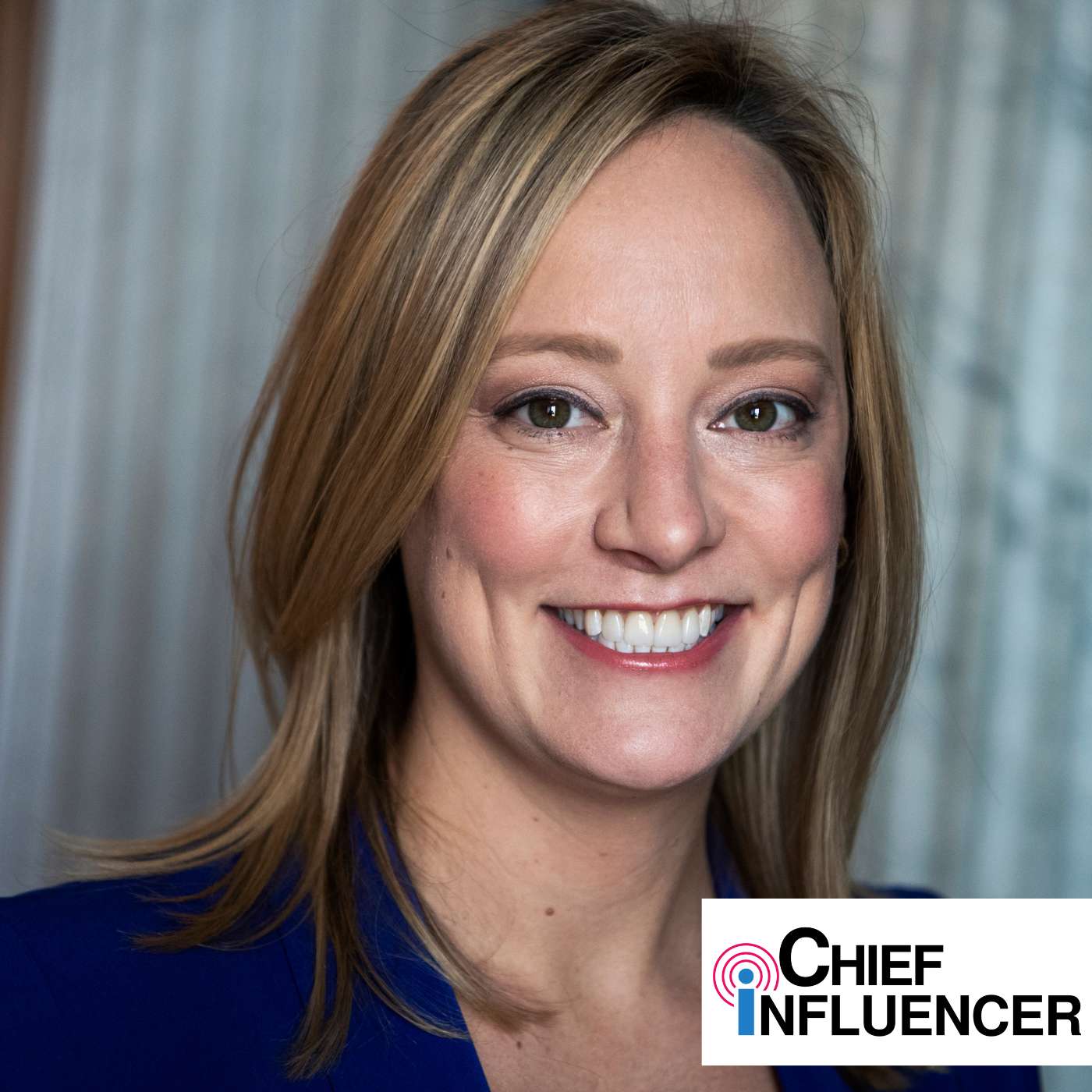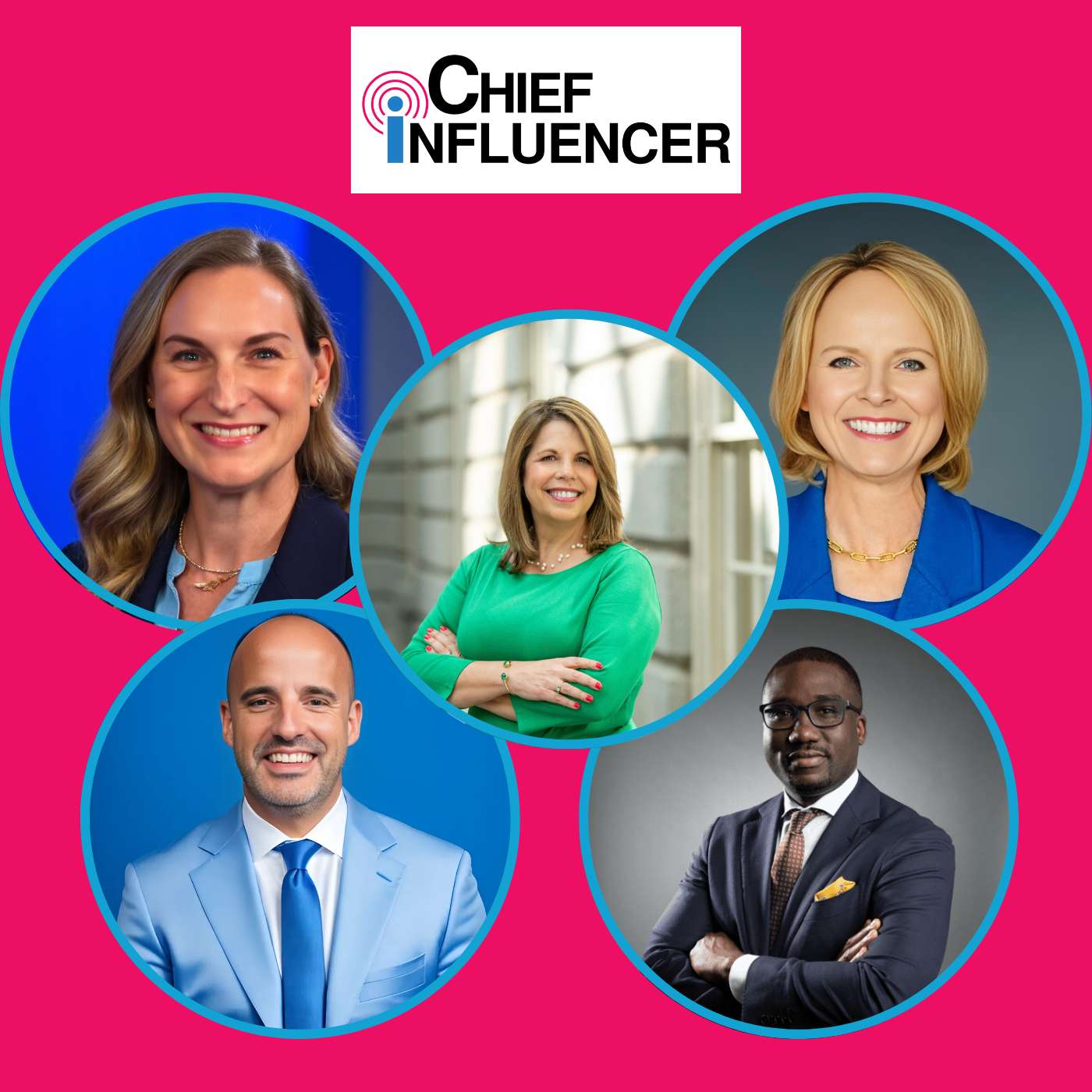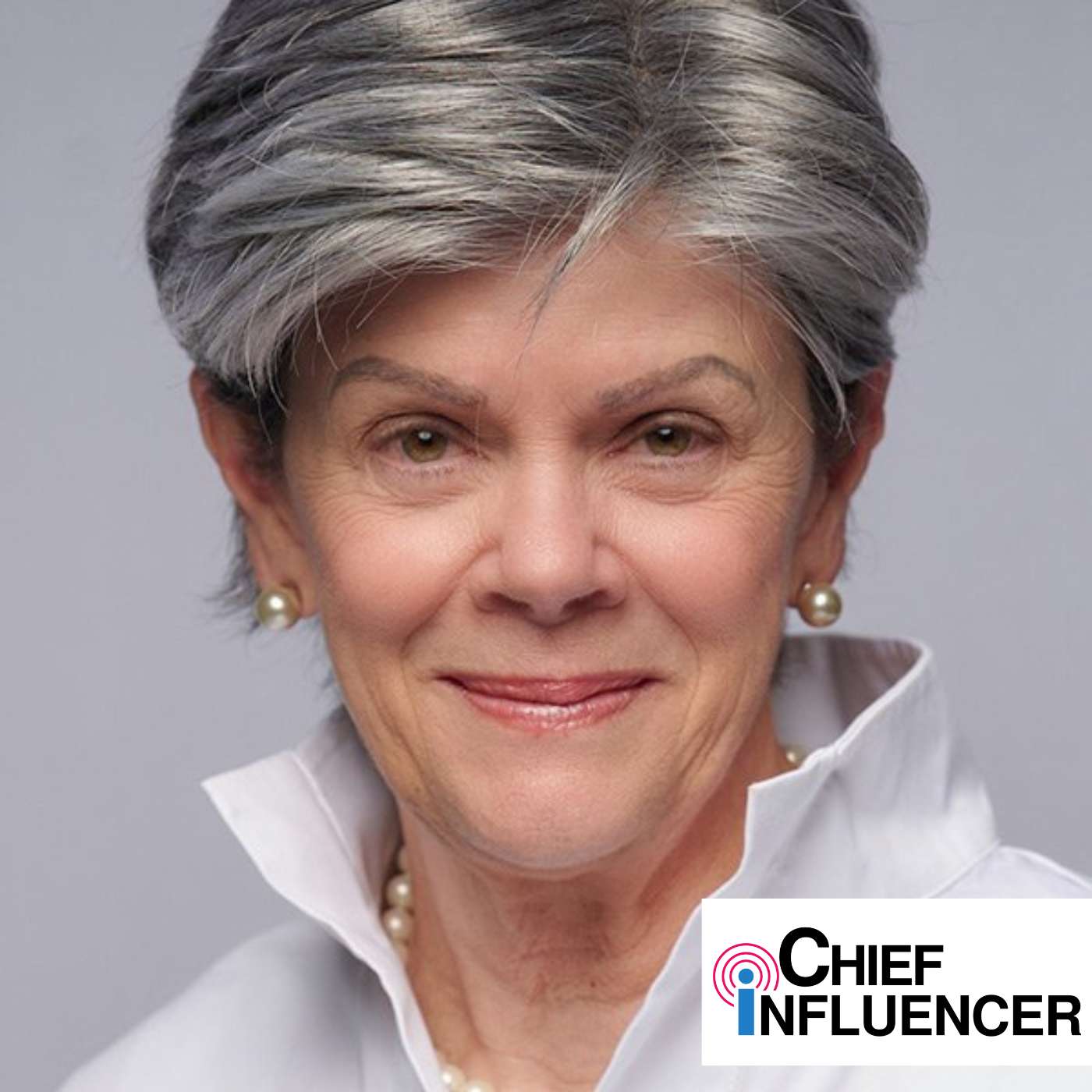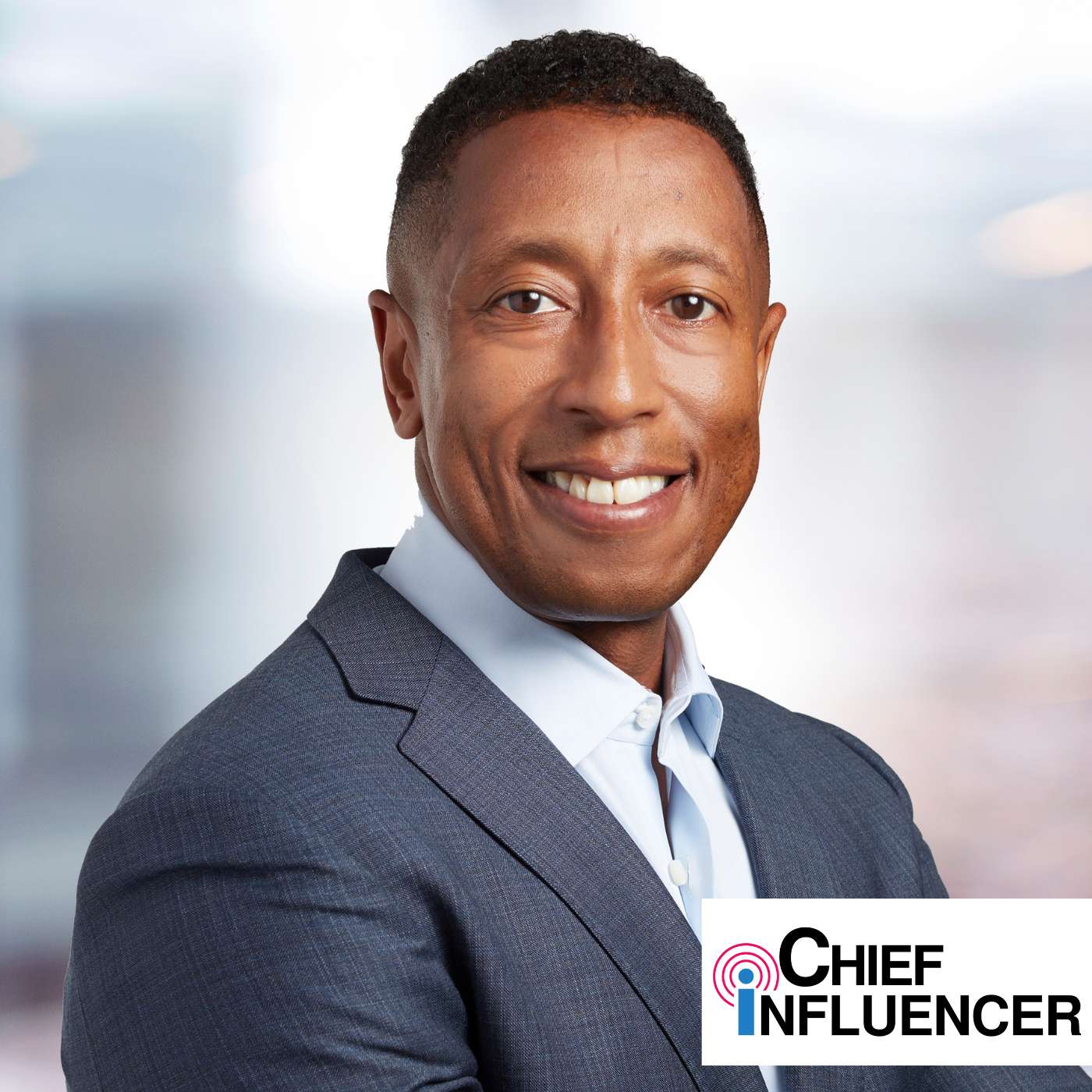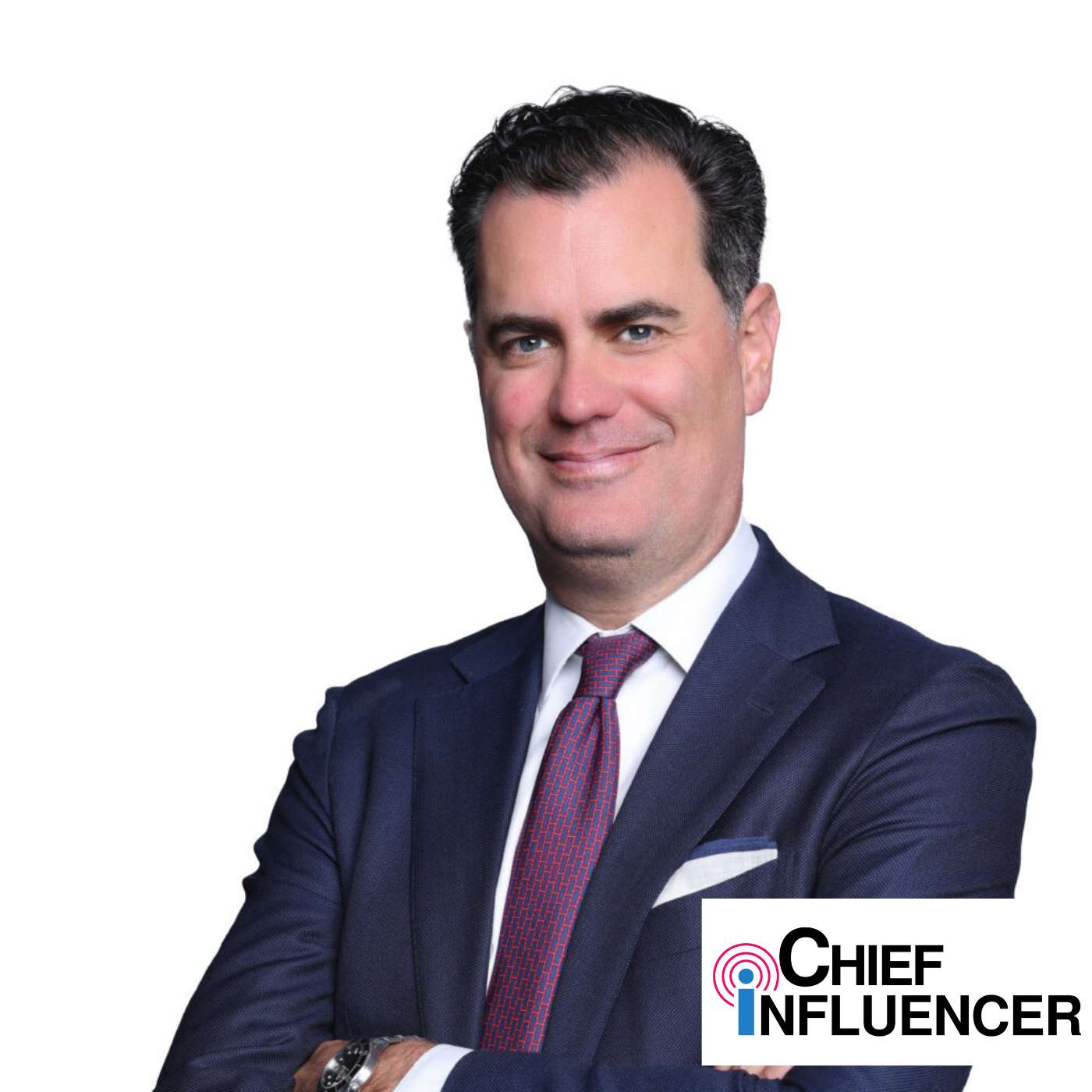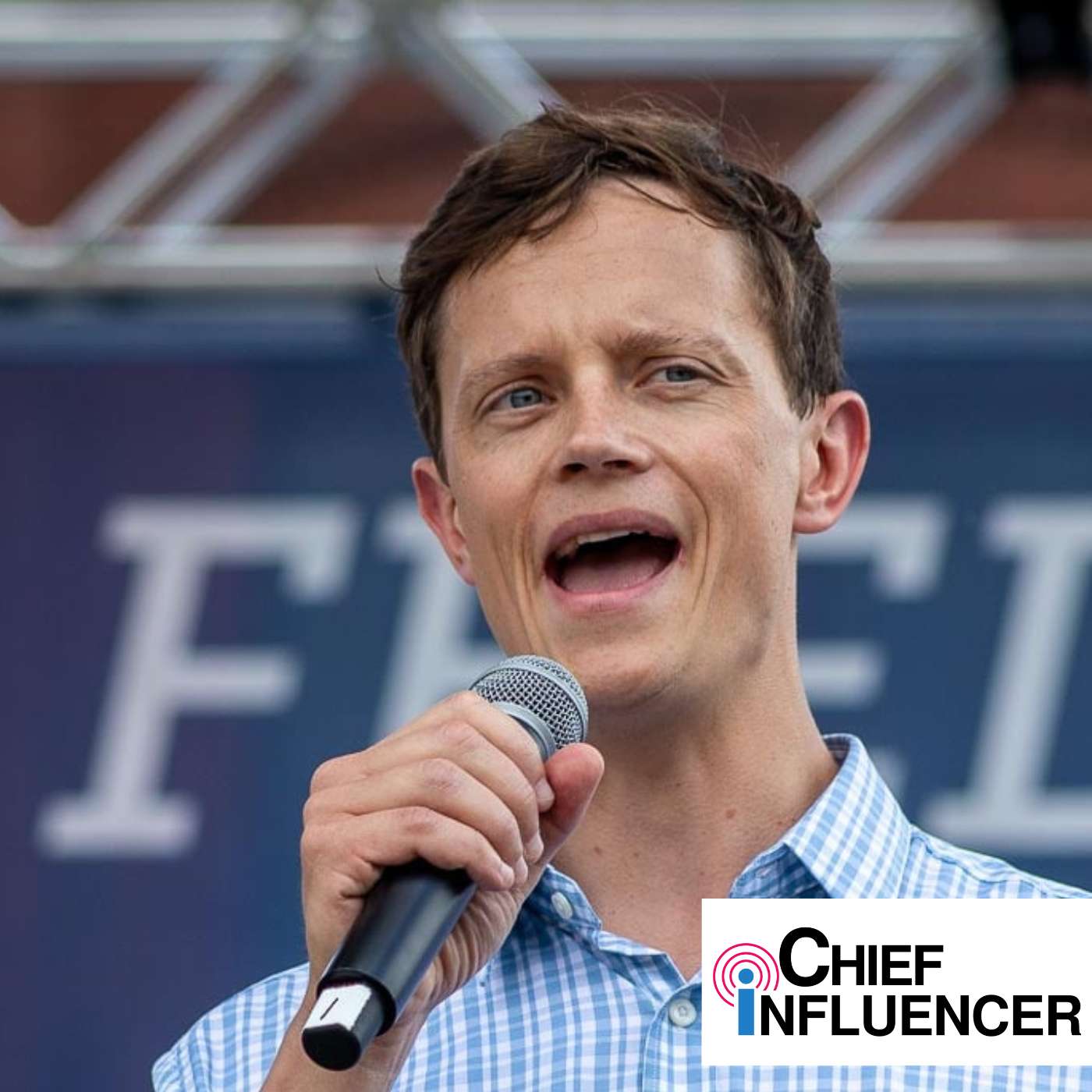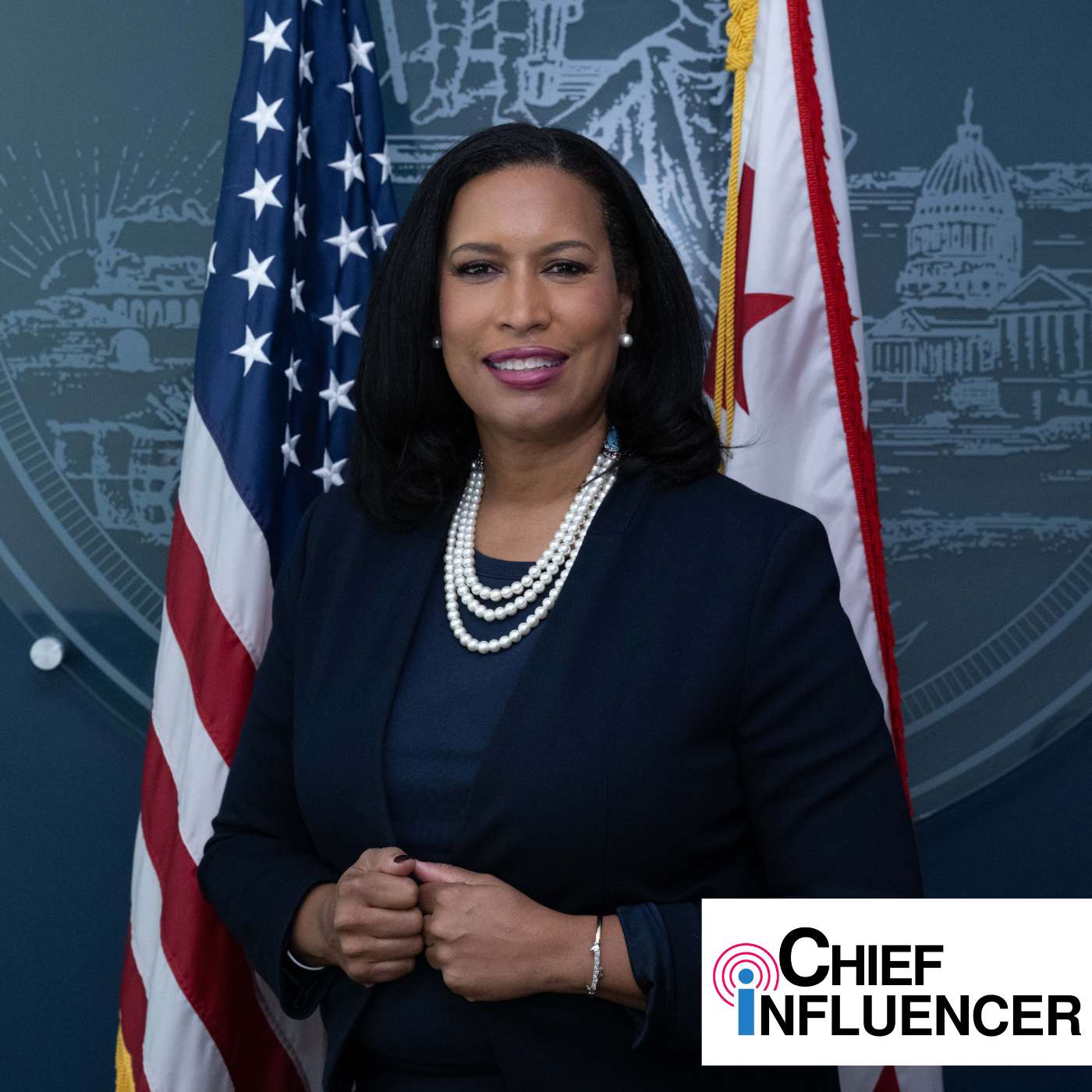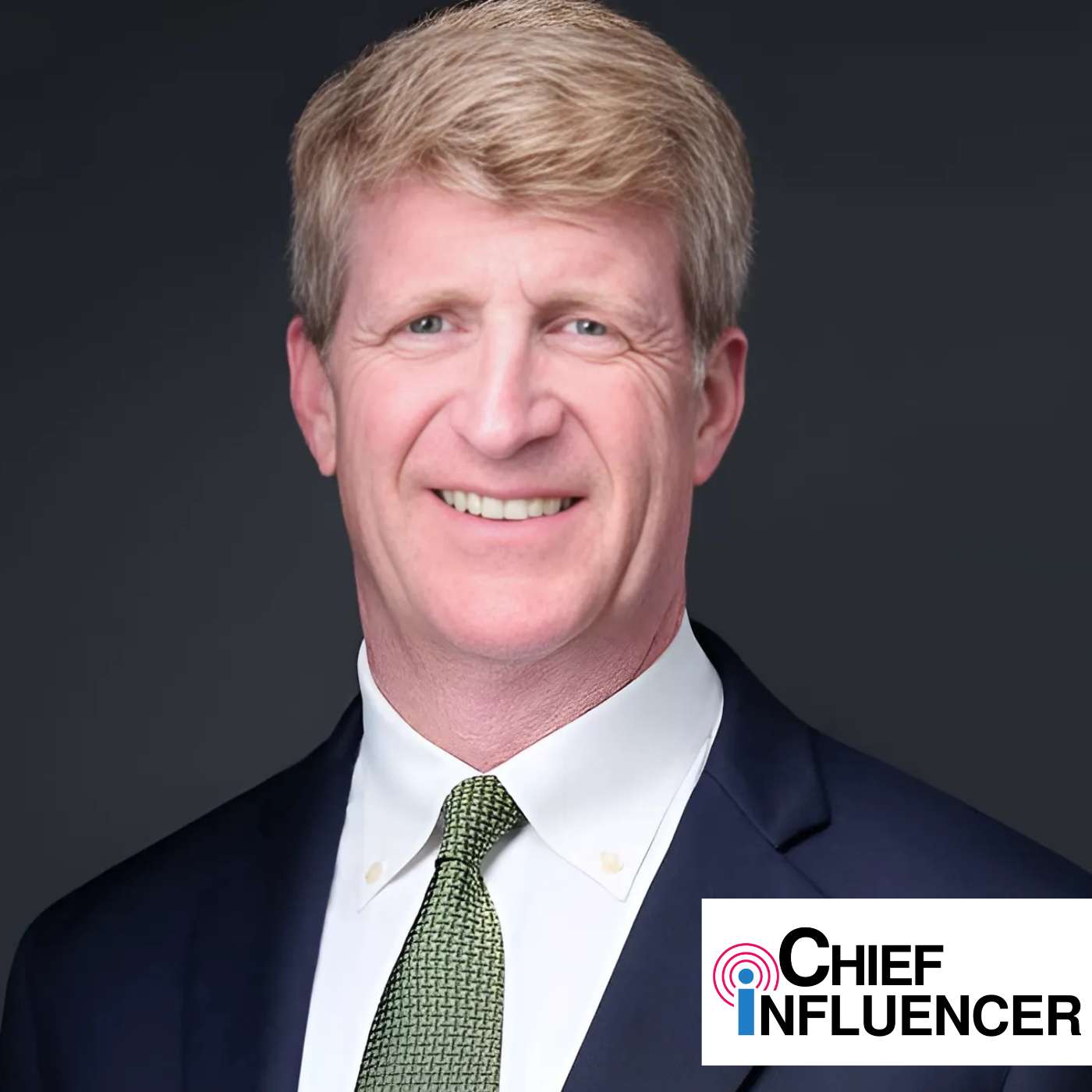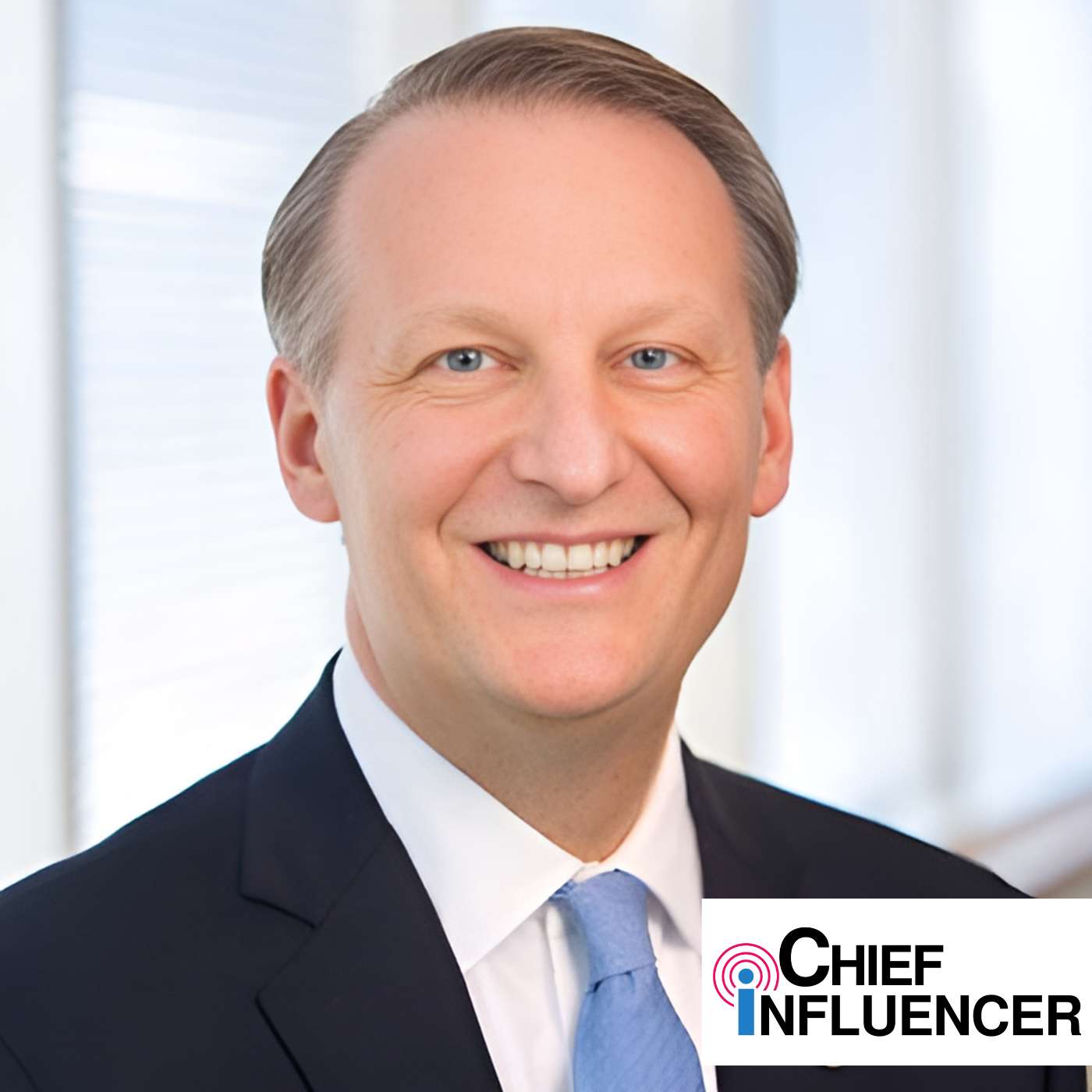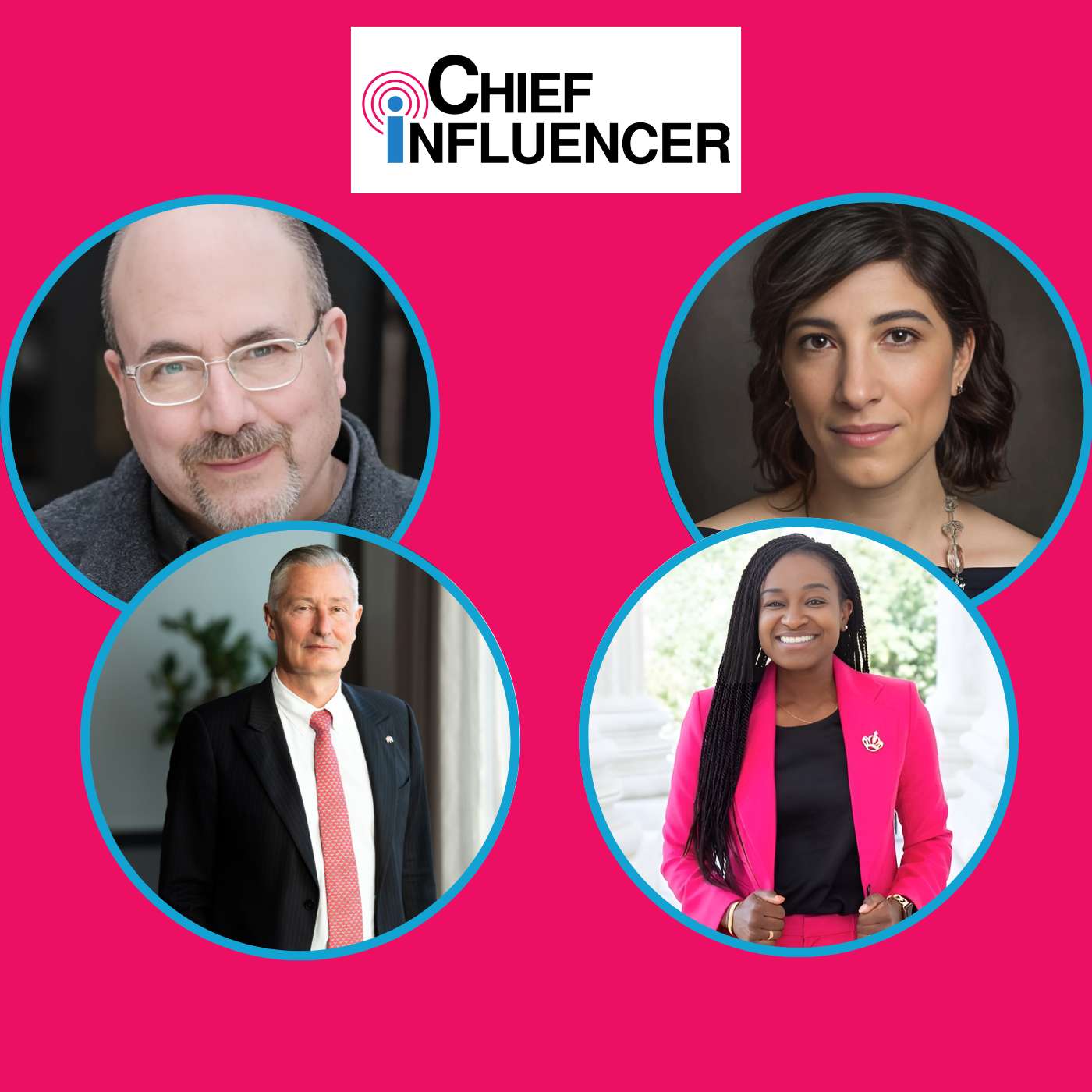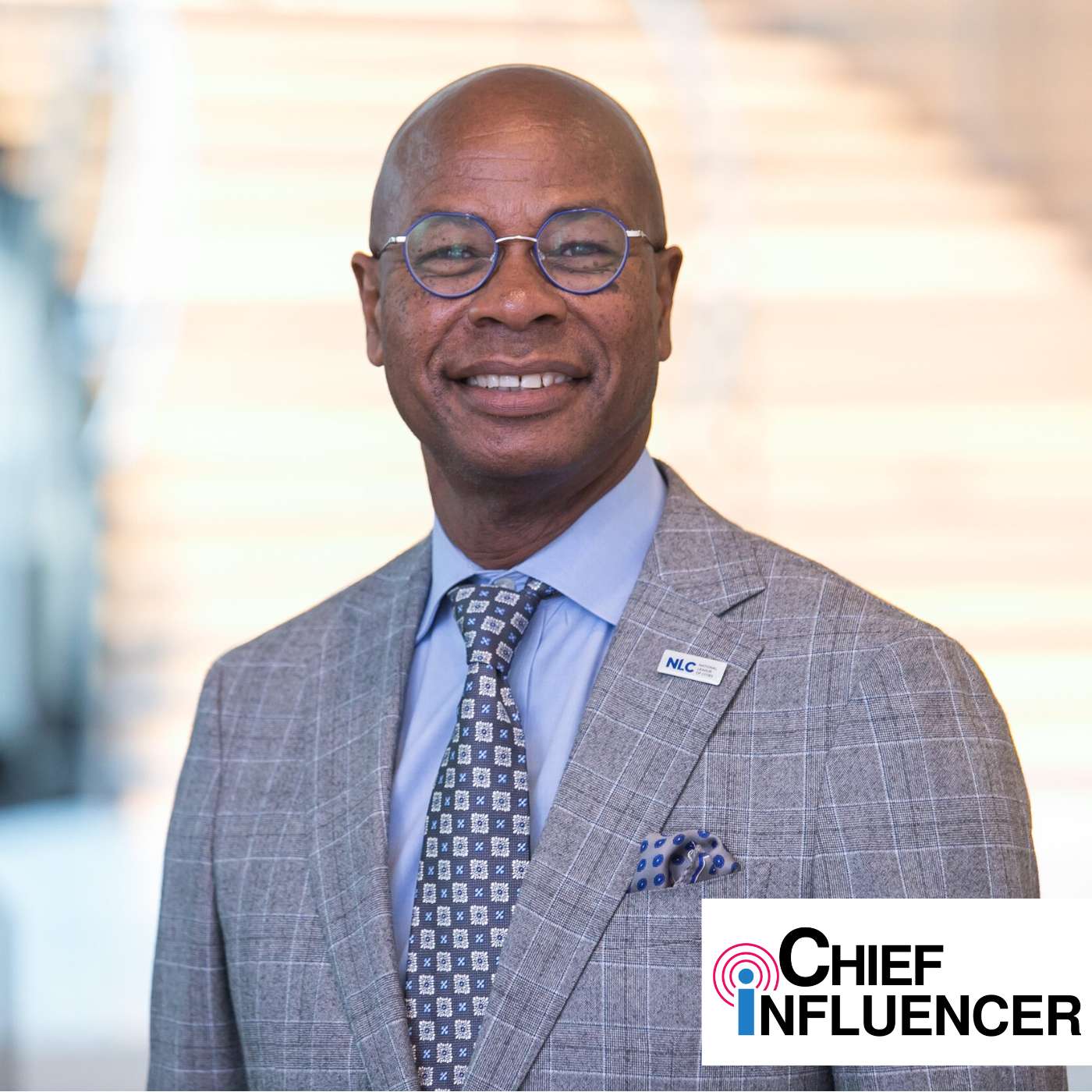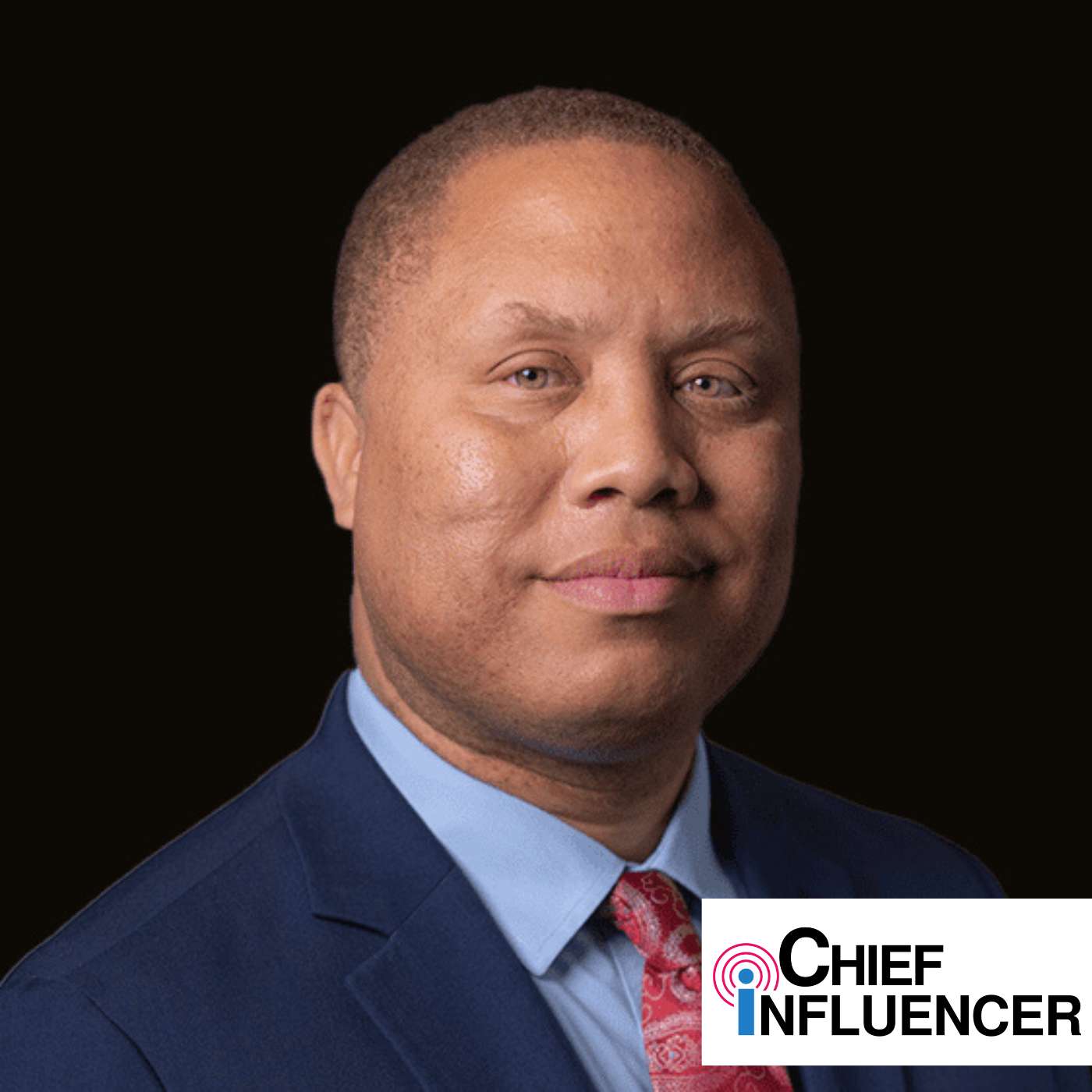Discover Chief Influencer
Chief Influencer

Chief Influencer
Author: Social Driver
Subscribed: 2Played: 13Subscribe
Share
© 2025 Social Driver
Description
Washington is the Center of Influence - in the U.S. and arguably the world. Chief Influencer spotlights leaders who have figured out how to break through in today’s fragmented and noisy world. Social Driver teamed up with The George Washington University College of Professional Studies and The Communications Board to recognize these leaders as Chief Influencers and highlight how they inspire and influence others.
119 Episodes
Reverse
Dr. Brian Castrucci, President and CEO of the de Beaumont Foundation, shares his journey from early-career public health professional to nationally recognized chief influencer. He describes his philosophy of venture philanthropy, approaching the foundation not as a traditional grant-maker, but as a risk-tolerant changemaker, much like an investor on Shark Tank. For Dr. Castrucci, philanthropy’s greatest asset isn’t cash, it’s the courage to take risks and go where others won’t. This mindset is reflected in the foundation’s efforts to boost vaccination rates among conservatives and in the strategic, mutually beneficial partnerships it forges across the public health sector.He reflects on pivotal career moments, including advice from a mentor to go "be a pirate" before returning to philanthropy and the experience of being passed over for the CEO role, a setback he now sees as crucial for shifting his focus from personal achievement to organizational growth. Throughout the conversation, Dr. Castrucci emphasizes the importance of building an authentic, bottom-up work culture, using storytelling to advance public health, and embracing discomfort as a catalyst for growth.Takeaways:Align Roles with Individual Strengths: A leader's job is to put people in positions where they can succeed and feel fulfilled. Instead of rigidly adhering to a job description, identify what your team members are uniquely good at and align their tasks accordingly. For example, if one person is a phenomenal community organizer but a weaker writer, let them focus on outreach while a stronger writer on the team handles those tasks.Go Where No One Else Is: To have an outsized impact, especially as a smaller organization, find the niche where others aren't working. Dr. Castrucci applied this by pivoting to focus on COVID-19 vaccine messaging for conservatives when most other large foundations were focused on communities of color, allowing de Beaumont's investment to have a significant, undiluted impact.Embrace Risk and Learn from Mistakes: View philanthropy and leadership through a "venture" lens where risk is your most valuable asset. Your role isn't just to implement what's already proven but to fund new ideas and evolve the evidence base for your field. Adopt the mindset that it's okay to make mistakes, as long as you learn from each one and don't repeat it.Foster a Culture of Authenticity: Leaders set the tone for the entire organization. By being open about your own life and priorities outside of work—such as leaving early for a child's concert—you make it acceptable for everyone else to bring their whole selves to work. This creates a more supportive and humane environment where people are comfortable sharing when they need flexibility.Practice Bi-Directional Mentorship: Mentorship shouldn't only flow from the "grizzled older veteran" to the early-career professional. Leaders can gain valuable perspective and stay ahead of evolving trends by actively learning from Gen Z and millennial employees. Use platforms like LinkedIn to engage in these egalitarian exchanges of ideas, where a good idea can be recognized regardless of age or title.Hire for Hunger and Smarts, Not Just Experience: Look beyond traditional credentials to hire people who are "whip smart" and hungry to learn, even if they seem inexperienced for the role on paper. This approach allows you to attract incredible talent that larger organizations might overlook. Throwing smart, capable people onto the field on day one allows them to rise to the occasion and accelerates their career growth.Help Others See Their Place on a New Path: Influence is the ability to help people see a path they wouldn't have seen on their own. When leading change, it's critical to show each individual how they and their unique skills still fit in—and are valuable—on the new path forward. This addresses the natural human desire for both organizational and individual achievement, ensuring people will follow you into uncharted territory. Quote of the Show:“Influence is the ability to help others see a path that they would not have seen on their own.”Links:LinkedIn: https://www.linkedin.com/in/brianccastrucci/ Website: https://debeaumont.org/
Nneka Chiazor, President of the Public Affairs Council, discusses the evolving role of influence, leadership, and authenticity in today’s complex and fast-paced environment. Drawing on her deep experience in both the public and private sectors, including leading 1,200 employees at Cox Communications, Nneka shares why public affairs is no longer a cost center but a strategic investment in social capital. She unpacks her “Mercy Framework” for thoughtful leadership, discusses the importance of internal influence, and reflects on how leaders must now show up with intention, reliability, and heart. From the Queen Elizabeth II communication rule to the power of LinkedIn as a platform for authentic thought leadership, this episode is filled with real talk, practical insights, and inspiring wisdom.Takeaways:Influence Begins Within: You can’t have external champions without internal ones. Employees are trusted messengers; make sure they’re equipped and aligned with your message.Use the Mercy Framework to Prioritize Thoughtfully: When taking on new roles or initiatives, ask: What should we Maintain, Expand, Reduce, Cease, or Introduce? Only introduce after creating space.Treat Public Affairs as a Strategic Investment: In a VUCA world (Volatility, Uncertainty, Complexity, Ambiguity), public affairs professionals are critical partners to the C-suite, unlocking both markets and trust.Pour Into Senior Leaders Before They Burn Out: Leaders are often so focused on pouring into others that they neglect themselves. Organizations should invest in refilling their leaders’ cups through support and development.Live by the Queen Elizabeth II Rule: Before speaking or posting, ask: Is it kind? Is it necessary? Is it true? This simple filter builds credibility and maintains trust.Build Your Personal Brand Authentically: You are You, Inc. Consistency in values across all platforms, especially LinkedIn, builds trust. Let your lived experiences serve as bridges to others.Influence with Intention: True influence isn’t just about getting someone to act; it’s about helping them feel good about taking that action. That’s where meaningful impact begins.Quote of the Show:"Intention is the word. How we live, how we make our mark, and how we ensure that the dash between our birth and death is filled with purpose, impact, and meaning."Links:LinkedIn: https://www.linkedin.com/in/nneka-chiazor/ Website: https://linktr.ee/pacouncil
Graham McMahon, President and CEO of the Accreditation Council for Continuing Medical Education (ACCME), discusses how he's revolutionizing medical education not as a compliance task but as an invigorating journey for clinicians. McMahon brings a wealth of experience from Harvard Medical School and the New England Journal of Medicine, advocating for learning as a lifelong privilege. Key topics include the evolution of educational approaches, the importance of applying information contextually in patient care, and fostering collaboration across medical hierarchies. Emphasizing trust and authenticity, McMahon also reflects on personal identity in leadership and how endurance running teaches perseverance and resilience. This conversation illustrates the transformative impact of education on clinician performance and patient outcomes, grounded in humility and professional integrity.Takeaways:Trust is the foundation of influence and is built on authenticity and consistency. Graham McMahon emphasizes that trust is essential for effective influence, whether with a patient, a colleague, or in system-wide change. This trust is hard to gain and easy to lose, requiring leaders to "walk the talk" and maintain a clean record. Showing up as your authentic self is key to building this foundational trust.Modern medical education has shifted from information transfer to the application of knowledge. With information readily available to both clinicians and patients, the focus of medical education is now on applying that information to complex, contextual problem-solving for individual patients. The goal is to elevate the human clinician's role in guiding patients to the best decisions for their specific needs.Effective collaboration requires sacrificing some autonomy for the greater good. To break down silos and drive systemic change, leaders must be willing to compromise and harmonize with partners rather than expecting others to conform to their rules. McMahon points to the ACCME's collaboration across professions in medicine, nursing, and pharmacy as an example of creating a unified framework that serves the entire community.A successful framework for influence and collaboration involves four key steps. McMahon outlines a strategy applicable in both professional and personal contexts: 1) Establish a reputation of trust; 2) Set a shared, common goal; 3) Develop a fair pathway to achieve the goal; and 4) Set meaningful, short-term benchmarks to build momentum.Embracing risk is crucial for innovation and growth. Leaders must be willing to take calculated risks to move beyond the seductive comfort of the status quo. This requires creating a culture where the team trusts the leader, agrees on the ultimate goal, and understands that not all risks will succeed. It's equally important to recognize when an initiative isn't working and be willing to "pull the plug".Authenticity unlocks personal and professional potential. McMahon shares his personal experience as a gay immigrant, explaining that hiding parts of one's identity can be a significant constraint. Allowing people to be their authentic selves fosters a positive environment, builds trust, and brings a diversity of lived experiences and new ideas to the workplace.Leadership involves lifelong learning and mentorship. Effective leaders not only mentor others but also actively seek guidance and wisdom themselves, often from people outside their immediate field. McMahon stresses the importance of passing on lessons learned from his own mentors while remaining open to new advice to continue his growth.Quote of the Show:"That joy of realizing I could make a difference for someone else is exactly why I chose education to be a core part of how I show up in this profession and in the house of medicine."Links:LinkedIn: https://www.linkedin.com/in/grahammcmahon/ Website: https://accme.org/
This special episode of Chief Influencer features guest host Liesl Riddle, Dean of the College of Professional Studies at the George Washington University, and Lorraine K. Lee, a bestselling author and authority on workplace communication and executive presence. Lorraine, known for her work with top-tier organizations like Amazon, Zoom, and Cisco, shares insights from her book 'Unforgettable Presence' and her extensive experience as a keynote speaker and LinkedIn Top Voice. She discusses the concept of 'presence'—its importance, definition, and how to cultivate it effectively. Lorraine also emphasizes the significance of personal branding, listening, storytelling, and maintaining a strong LinkedIn presence. Additionally, she shares strategies for introverts and the impact of influence on professional growth. Throughout the episode, Lorraine provides practical tips and frameworks to help professionals at any stage enhance their visibility and build a successful career.Takeaways:Upgrade your LinkedIn profile with three quick changes to boost visibility and credibility. Simple tweaks like updating your headline, adding a professional photo, and refining your summary can make your profile stand out to recruiters and peers.Craft a unique and powerful introduction using the UPI (Unique and Powerful Introduction) framework. Introducing yourself with authenticity and impact helps you make memorable first impressions in professional settings.As an introvert, contribute after meetings by following up with thoughtful written input. If you’re not comfortable speaking up in real time, sending a follow-up email or message ensures your ideas are heard and valued.Take ownership of your career by thinking and acting like the CEO of your own professional journey. Proactively set goals, seek opportunities, and make strategic decisions to drive your career forward.Use feedback loops and regular iteration to accelerate your personal and professional growth. Consistently seeking feedback and making small improvements helps you learn faster and achieve better results.Apply the "TEA Method" to improve your video presence and communication effectiveness. Focusing on both the depth and breadth of your message ensures you connect with your audience and convey your expertise.Advocate for yourself by sharing your story, as illustrated in the "Audiobook Recording" example. Telling your own story with confidence can open doors and inspire others to recognize your value.Quote of the Show:“Presence is for everyone, at every level. When we approach our careers with intention and proactive energy, we create better outcomes.”Links:LinkedIn: https://www.linkedin.com/in/lorraineklee/ Website: https://lorraineklee.com/ Book: https://amzn.to/3Hdv79rFree weekly career tips: lorraineklee.com/subscribe
Anna Palmer, the founder and CEO of Punchbowl News, a media company focused on the power, people, and politics of Washington, D.C.. Palmer details the creation and growth of Punchbowl News, which she co-founded during the COVID-19 pandemic to provide an insider's perspective on the U.S. Congress. She explains that her company’s success is built on a community-centric model that views its audience as members, not just subscribers, fostering a two-way relationship through newsletters, podcasts, premium content, and live events. Palmer repeatedly emphasizes that authenticity, trust, and providing unique, analytical reporting are essential for cutting through the noise of the modern media landscape and building a sustainable business that can thrive in the age of AI.Takeaways:Build a Community, Not Just an Audience: Palmer attributes Punchbowl News's success to treating its audience as "community members". This creates a "flywheel" effect where readers, event attendees, and sources are part of an interconnected ecosystem, fostering deep loyalty and a sustainable business model that isn't solely reliant on advertising or search traffic.Authenticity is the Key to Trust: In a world where people are "flooded with so much information," Palmer insists that authenticity is what allows a brand to cut through the clutter. This is achieved by moving away from scripted corporate messaging, showing personality, and being open and quick to admit when you are wrong, which builds significant trust with your audience.Human-Centered Reporting is the Defense Against AI: While Punchbowl News uses AI as a business tool, Palmer believes the key to journalistic relevance is creating original, analytical content that an AI cannot. She notes that AI can't be "in the basement of the Capitol" to ask a senator a question and interpret the nuanced answer, making human reporting invaluable.Modern Journalists Must Be Multimedia Experts: According to Palmer, a reporter's job has evolved from simply writing to being a "Swiss Army knife" with multimedia skills. She emphasizes the need for journalists to be adept at podcasts, video, events, and social media to connect with audiences across different platforms.Effective Newsletters Require Consistency and Value: As a veteran of newsletter journalism, Palmer advises that success in a crowded inbox depends on providing unique content that people can't get elsewhere. She stresses the importance of frequency and consistent timing to build a habit for readers.Influence is More Fragmented and Accessible: Palmer notes that the nature of influence in Washington has changed. It is no longer concentrated among a few traditional power brokers but has become more fragmented across different platforms like podcasts and social media. This creates more opportunities for different voices to exercise influence.Personal and Professional Brands are Blurring: Palmer acknowledges that the Punchbowl News brand is deeply intertwined with the personal brands of its founders. She has become more active and "human" on platforms like LinkedIn and Instagram, finding that showcasing the authentic person behind the corporate announcements pays dividends.Quote of the Show:“Having trust, authenticity, and a message that really resonates are gonna be three key things to actually keep that influence and try to grow it.”Links:LinkedIn: https://www.linkedin.com/in/anna-palmer-124a295/ Website: https://punchbowl.news/ Shout Outs:Jake Sherman: https://www.linkedin.com/in/jake-sherman-6baa0b9/ John Bresnahan: https://www.linkedin.com/in/john-bresnahan-a6919294/ Elizabeth Dole Foundation: https://www.elizabethdolefoundation.org/
In this heartfelt episode of Chief Influencer, host Anthony Shop sits down with Mary Fete, Executive Director of the National Foundation for Ectodermal Dysplasias (NFED). A registered nurse by training, Mary shares how listening has been the foundation of her leadership, fueling a global nonprofit that spans 120 countries and supports thousands of families affected by rare disorders. She reflects on the transformative power of empathy, the importance of collaboration over expertise, and her role in pioneering medical breakthroughs, including a historic clinical trial for XLHED. As she prepares to pass the baton after more than two decades, Mary discusses her hopes for the future and what it truly means to lead with heart.Key TakeawaysLeadership Begins With Listening: Mary emphasizes that listening is both a clinical and leadership skill. Her philosophy of “listen first, talk less” has shaped NFED’s programs, research, and family support systems.You Don’t Have to Be the Expert: True influence comes from bringing the right people into the room. Mary models collaborative leadership by creating spaces where diverse experts—and lived experiences—drive innovation.Global Impact Starts With Personal Connection: Despite serving families in over 120 countries, NFED remains deeply personal thanks to Mary’s intentional relationship-building and trust-first approach.Technology as a Humanizing Tool: From AI advisory boards to using databases to remember personal family milestones, Mary shows how nonprofits can leverage tech to enhance—not replace—authentic relationships.From Seed Funding to Scientific Breakthroughs: NFED’s 30-year commitment to research led to the groundbreaking EDELIFE clinical trial, showing how a small nonprofit can play a central role in global medical advances.Storytelling Drives Advocacy: Mary empowers families to share their lived experiences to influence policy and funding, reinforcing that personal stories are powerful tools for public impact.Legacy of Heartfelt Leadership: As she prepares to step down, Mary hopes to be remembered not for titles or milestones, but for leading with compassion, listening deeply, and creating a true sense of family and belonging.Quote of the Show:“You have to remind yourself that listening is much more powerful than talking… You don’t have to fill the space in the room with your voice all the time.”Links:LinkedIn: https://www.linkedin.com/in/mary-fete-19949a33/ Website: https://nfed.org/
In this special Chief Influencer Power Breakfast episode, Anthony moderates a dynamic panel featuring five powerhouse nonprofit CEOs. Together, they explore how leaders can harness the power of personal branding to amplify their missions and drive greater impact.You'll hear real-world strategies and inspiring stories from:📌 Steve Schwab (Elizabeth Dole Foundation)📌 Jean Accius (Creating Healthier Communities)📌 Katie Schubert (Society for Women’s Health Research)📌 Jennifer Sirangelo (Points of Light)📌 Lidia Soto-Harmon (Student Conservation Association)Discover practical tips for staying authentic, elevating others, and using social platforms to build influence. Whether you're leading a nonprofit or looking to grow your own leadership brand, this conversation will equip you with the insights to take the next step forward.Takeaways:Start from Within: Make sure your internal team, staff, board, and volunteers understand and champion your mission. Internal alignment fuels external influence.Prioritize Authenticity: Share real, personal stories in your own voice. This helps build trust and deepens audience connection. Don’t be afraid to show who you are behind the title.Use Social Media Strategically: Even simple tactics like tagging people and using @ mentions can significantly expand your reach and engagement.Create a Posting Routine: Block small pockets of time, like at the airport or between meetings, to engage on platforms like LinkedIn. Consistency matters more than frequency.Leverage Visual Tools: Think creatively about how to drive connections. For example, use a LinkedIn QR code on your name badge to make networking easy and immediate.Elevate Others: Use your platform to spotlight team members, partners, and community leaders. Sharing the stage amplifies your mission and builds goodwill.Engage Without Overthinking: You don’t have to post every day. Commenting, liking, or resharing valuable content is just as impactful, and a great way to start building your presence.Quote of the Show"It’s irresponsible for nonprofit leaders not to have a LinkedIn presence." — Steve SchwabLinks:Kathryn Godburn SchubertLinkedIn: https://www.linkedin.com/in/kathryn-godburn-schubert-07352a7/ Website: https://swhr.org/ Jean AccuiusLinkedIn: https://www.linkedin.com/in/accius4/ Website: https://chcimpact.org/ Jennifer SirangeloLinkedIn: https://www.linkedin.com/in/jennifer-sirangelo-62a8723/ Website: https://www.pointsoflight.org/ Lidia Soto-HarmonLinkedIn: https://www.linkedin.com/in/lidia-soto-harmon-a921a213/ Website: https://thesca.org/ Steven SchwabLinkedIn: https://www.linkedin.com/in/steven-schwab7676/ Website: https://www.elizabethdolefoundation.org/
What does it take to protect freedom of expression in a time when Americans are more divided than ever? Jan Neuharth is the Chair and CEO of the Freedom Forum, a nonpartisan nonprofit dedicated to fostering First Amendment freedoms for all. She shares the story of how she led the organization through a bold transformation—from operating a museum on Pennsylvania Avenue to becoming a mission-driven force for digital education, public programs, and national impact. From honoring young journalists and comedians at the Free Expression Awards to empowering students with their First Amendment rights through campus outreach and storytelling, Jan reflects on how the Freedom Forum connects with Americans across generational and ideological divides.She also shares leadership lessons on influence, including the importance of listening, trust, and process in navigating change. Tune in to hear how Jan’s diverse career—from Capitol Hill to corporate law to novel writing—has shaped her authentic leadership style and deep commitment to civic engagement and free expression.Takeaways:Lead with Listening: Influence starts by understanding your audience. Whether you're guiding organizational change or connecting with the public, listening first builds trust and informs better decisions.Preserve the Best, Improve the Rest: This philosophy, inherited from Jan’s father Al Neuharth, is a powerful framework for innovation. Regularly assess what’s working and have the courage to evolve—even beloved institutions like museums.Make the Mission Personal: Humanize big ideas like the First Amendment by tying them to everyday experiences—books, fashion, music, sports fandom. Personal relevance drives engagement.Adapt Messaging for Different Levels of Engagement: Think in tiers: skimmers, swimmers, and divers. Tailor your content to meet people where they are—whether they want a quick TikTok or a deep-dive article.Invest in the Next Generation: Empowering young people with knowledge of their rights, as the Freedom Forum does through its Free Spirit program and campus initiatives, ensures the future of civic engagement and journalism.Stand Firm on Principles, Not Partisanship: Uphold core values like free expression consistently, even when the subject matter is controversial. Integrity and viewpoint neutrality build long-term credibility.Turn Disruption Into Opportunity: When COVID hit just after the museum closed, the Freedom Forum used the moment to go digital-first. Challenges can be catalysts for reinvention if approached with strategic clarity.Quote of the Show:“You don't change the story for every person. You tell it in a different way, but you're still rooted in the same principles.”Links:LinkedIn: https://www.linkedin.com/in/janneuharth/ Website: https://www.freedomforum.org/
Allan Golston is the President of the United States Program at The Gates Foundation. The foundation is dedicated to advancing educational opportunities and ensuring equitable academic and economic outcomes for all students, particularly those from low-income backgrounds and students of color. Allan's unique leadership approach hinges on the power of influence through reciprocity, authenticity, and storytelling. In today's episode, Allan delves into his career journey from public accounting to philanthropy, the importance of building trusted partnerships, the evolution of leadership styles, and leveraging digital platforms like LinkedIn for reciprocal influence. Stay tuned to gain valuable insights on balancing data-driven decision-making with personal storytelling to drive impactful change and the importance of creating authentic connections in both personal and professional spheres.Takeaways:Treat leadership as a continuous practice, not a destination, and continuously strive for self-improvement. Allan Golston emphasizes that leadership is an ongoing process. He makes it a point to learn and grow each day, preparing to be even better the next day. This practice of self-reflection and ongoing improvement can help leaders stay dynamic, relevant, and effective.Be authentic in your leadership and influence based on genuine interactions rather than projecting a persona. Early in his career, Golston found that employers expected employees to project a certain persona or dress a certain way as part of instilling confidence in clients. However, as his career evolved, he realized that authenticity became crucial for effective leadership as his responsibilities grew. Leaders should focus on genuine connections and interactions, which build trust and authenticity.Embrace a two-way influence model. Listen and be open to being influenced while also trying to influence others. This influence needs to be reciprocal. Authentic listening and a willingness to be influenced are as important as trying to guide or direct others. This approach builds mutual respect and understanding.To drive meaningful impact, deeply understand your audience. This is crucial for making informed and impactful decisions. Leaders must invest time learning about their internal and external teams and stakeholders and broader audiences to tailor their actions and communications effectively.Aim to ensure equitable outcomes in your leadership practice and organizational goals. Leaders should prioritize creating inclusive environments and opportunities that benefit all, especially the underrepresented or marginalized groups.Openly share your personal stories and learn from the stories of others. This practice fosters a deeper connection and understanding within the team, helping to build a cohesive and empathetic workplace culture.Start interactions with personal concerns and show genuine interest in your team’s well-being. Instead of diving straight into work-related discussions, begin with personal conversations. Asking about someone's well-being or family circumstances shows empathy and builds a culture of care and support.Quote of the Show:“I fundamentally believe that influence has two key dimensions. Number one is that it has to be reciprocal. You have to be open to being influenced as much as you are trying to influence. The second is that you have to know when it’s best to influence directly or empower others to influence and carry the critical messages.” - Allan GolstonLinks:LinkedIn: https://www.linkedin.com/in/allan-golston Bill & Melinda Gates Foundation (Website): https://usprogram.gatesfoundation.org/Shout Outs:Stryker: https://www.stryker.com Harley-Davidson: https://www.harley-davidson.com Aspen Institute - The Henry Crown Fellowship Program: https://www.aspeninstitute.org/programs/henry-crown-fellowship The Robert Wood Johnson Foundation: https://www.rwjf.org The William Jewell College: https://www.jewell.edu John Lewis: https://www.britannica.com/biography/John-Lewis-American-civil-rights-leader-and-politician
Tiffany Benjamin, CEO of the Humana Foundation, founding partner of Face The Fight, and one of TIME's 100 most influential philanthropists, shares her unexpected journey from Harvard Law School to leading a major philanthropic foundation — a path shaped by lived experience, deep listening, and a passion for community.We explore how early moments, like volunteering with seniors as a youth, continue to influence her approach to leadership and social impact. Tiffany reflects on what it means to leave your title at the door, the surprising power of sitting in the back of the room, and how true influence is rooted in curiosity and co-creation.From building intergenerational programs to reshaping how we serve communities, Tiffany’s insights are both personal and profoundly actionable. Whether you're a leader, changemaker, or simply curious about what it means to make a difference, this episode is for you.Takeaways:Shaping Health Equity: Tiffany is pioneering health equity by mobilizing funding, partnerships, and research aimed at tackling the root causes of poor health. This includes a holistic approach to nutrition, emotional well-being, disaster recovery, and resource deployment.Value of Curiosity: Tiffany’s journey highlights the importance of curiosity. Her career path shifted dramatically because she was curious about the foundation work at Eli Lilly. Curiosity can open new career opportunities and lead to fulfilling roles that align with your passion and values.Community Listening: The Humana Foundation emphasizes community listening. By creating a Senior Council of high school seniors and senior citizens, the foundation ensures their work is community-centered and relevant to the people they serve. Consider forming advisory groups with diverse perspectives to guide your projects.Empathy as Influence: Empathy is a powerful form of influence. Tiffany suggests that listening to people’s challenges and really understanding their needs can drive meaningful change. Practice active listening and strive to connect with others on a deeper level to be a more effective leader.Accessibility in Processes: The open application process at the Humana Foundation is designed for transparency and respect for non-profits' time. It includes a short-form application and clear communication about acceptance or rejection. Make your processes transparent and provide clear feedback to foster trust and efficiency.Leave the Title at the Door:*Tiffany emphasizes the importance of humility and accessibility. By choosing to sit in the back of the room rather than the reserved front seat, she connects with people on a more personal level. Engage with people where they are, leave your title at the door, and be approachable.Use Digital Presence Authentically: Tiffany is hands-on with her LinkedIn presence to share her work and insights regularly. She combines personal elements (like her love for hats) with professional updates to maintain authenticity. Use social media platforms to share your story and mission, and be transparent and consistent in your communication.Quote of the Show:“I think you have to find spaces where you can leave your title at the door and be accessible to others. Personally, I have an aversion to sitting in the front row—I’d rather be alongside the people who are most impacted and who are driving real change. I believe you should always seek out those who know more than you, especially when it comes to the challenges and opportunities ahead.” Links:LinkedIn: https://www.linkedin.com/in/tiffany-benjamin-0127893/ Website: https://www.humana.com/
Frederique Irwin, President and CEO of the National Women’s History Museum, discusses her transformative vision for the museum to become a dynamic, digital-first institution reaching audiences nationwide. She reflects on her diverse career, starting from founding 'herCorner' to leading impactful initiatives at the Sorenson Impact Center. Fred highlights the significance of empowering women and her unexpected yet strategic move into nonprofit leadership. The conversation also covers the museum's advocacy for the Smithsonian’s New Women's History Museum on the National Mall, their digital-first strategy, and the campaign 'She’s Not a Footnote and Neither Are You.' The interview underscores the importance of storytelling, authenticity, and adapting to market needs as vital components of influence.Takeaways:Simplify Your Message: As Frederique shared, her mother taught her to make complex stories accessible. Translate complex information into simple, relatable terms that your audience can easily understand and engage with.Embrace a Digital-First Approach: The National Women's History Museum has successfully adopted a digital-first strategy, making their content accessible online. This is critical for reaching a broad audience, especially in today's digital age.Test and Iterate: Before committing to a complete overhaul (like a new website), test smaller initiatives to see how your audience responds. Frederique emphasized the importance of trying out different ideas and gradually amplifying what works.Focus on Authentic Storytelling: Authenticity is key. Frederique’s strategy involves consistent storytelling centered around women’s achievements. Real stories resonate more with audiences compared to generic, heavily messaged content.Know Your Audience: Identify and prioritize your primary audience to maximize impact. For the National Women’s History Museum, the focus is on educators and students, both inside and outside the classroom.Use Contemporary Campaigns: The 'She’s Not a Footnote' campaign highlights the importance of making historical content relevant and engaging today. Find creative and modern ways to package and present your content to maintain relevance.Listen to the Market: Pay attention to your audience’s feedback and be willing to adapt your strategies based on market responses. This iterative approach is fundamental in entrepreneurship and critical in ensuring your efforts align with audience needs.Quote of the Show:"I stay aligned with what feels genuine, keeping my message focused on women and making sure that comes through clearly on LinkedIn and social media."Links:LinkedIn: https://www.linkedin.com/in/frederiquecirwin/ Website: https://www.womenshistory.org/
Matt Haller, President and CEO of the International Franchise Association, shares his thoughtful and consistent approach to member engagement, both within his team and across his organization’s national network. From recognizing the power of elevating member voices through authentic storytelling, Matt shares how he positions people as the most valuable influencers.Takeaways:Hire a Great Team and Empower Them: As a leader, it's important to hire a talented team and then give them the space to excel. Provide guidance but avoid micromanaging to foster creativity and independence within the team.Always Follow Up: Responsiveness and consistent follow-up are crucial, especially in a service-oriented organization. This promotes reliability and trust both internally with your team and externally with clients or members.Build a Unified Team: Ensure that everyone on your team understands the common goal. Different skills and styles are valuable, but alignment on what the organization is trying to achieve is essential for collective success.Make Clear and Direct Requests: When engaging with stakeholders, whether in advocacy or business, make sure to establish a connection and clearly articulate your ask. This enhances the effectiveness of your communication efforts.Use Challenges as Motivators: Leverage crises or significant policy issues as opportunities to galvanize your team and membership. This can help highlight the importance of engagement and shared goals.Tell Your Story: Authentic storytelling from members or stakeholders is highly effective. Personal stories resonate more and help build trust and influence in various audiences.Embrace Change and Innovation: Trade associations and organizations should be forward-thinking about utilizing technology and data. Embrace change and continuously look for ways to innovate and grow, whether through strategic acquisitions or other means.Quote of the Show:“We have 800,000 of them in franchising...small businesses are the most trusted institutions in America.”Links:LinkedIn: https://www.linkedin.com/in/matthewhaller/ Website: https://www.franchise.org/
Rob Sand is the 33rd State Auditor of Iowa, known for his commitment to transparency, accessibility, and accountability in government. Elected in 2018, Sand previously served as Iowa’s Chief Public Corruption Prosecutor, where he led the investigation into the largest lottery rigging scheme in American history.He emphasizes the importance of being accessible to constituents through initiatives like Transparency Tuesdays, a weekly Facebook Live series where he directly engages with the public. Sand’s approach challenges traditional political norms by promoting openness and demystifying government processes.In this conversation, he also reflects on his career journey, discusses his book The Winning Ticket, and underscores the importance of clear communication and public trust in governance. At the core of his philosophy is a belief in working with anyone to do good and upholding integrity in public service.Takeaways:Constituent Influence Challenges: As an elected official, Rob must influence everyday people to create meaningful impact. This is increasingly difficult due to rising partisanship and the weakening of traditional political coalitions.Government Transparency Education: Rob provides an open look into how state government works. He educates the public about his role as state auditor and broader government functions.Statewide In-Person Engagement: Rob connects with Iowans by visiting all 100 county seats. These face-to-face conversations build trust and allow him to hear concerns directly.Direct Social Media Use: Rob actively manages his own social media accounts. This personal touch enhances authenticity and keeps constituents informed and engaged.Weekly Facebook Live Updates: Every Tuesday evening, Rob hosts “Transparency Tuesdays” on Facebook Live. He highlights his recent work and answers questions from viewers.Authentic Public Presence: Unlike many public figures who fear live interactions, Rob embraces them. His unfiltered approach resonates with people who value honesty and accessibility.Breaking Down Barriers: Rob uses social media to bridge the gap between government and citizens. This invites Iowans into meaningful dialogue and helps build community.Sharing Innovative Practices: Rob identifies effective practices from across counties and shares them statewide. He values practical solutions over partisanship, ensuring good ideas reach everyone.Quote of the Show:“It's important for people to have a sense of the ability to reach their government, to reach levers of whatever degree of power and to actually have an interaction there”Links:Twitter: https://twitter.com/RobSandIA Instagram: https://www.instagram.com/robsandia/ Facebook: https://www.facebook.com/robsandia/ LinkedIn: https://www.linkedin.com/in/robsand1/ Website: https://robsand.com/ The Winning Ticket: https://a.co/d/c9xQN6w
We are thrilled to present a special co-promotion episode, bringing you a fantastic discussion from the CitiesSpeak podcast, produced by the National League of Cities! Join CitiesSpeak host Clarence Anthony, CEO of the National League of Cities, for an insightful conversation with Washington, D.C. Mayor Muriel Bowser. Mayor Bowser shares her compelling journey into public service, her motivations for leading her hometown, and the unique aspects of governing a district that operates as a city, county, and state. Discover the strategies that have fueled D.C.'s impressive growth, its achievement of an AAA bond rating, and its recognition as one of the nation's fastest-growing districts. The dialogue dives deep into the critical issue of housing, exploring D.C.'s ambitious goals for increasing housing supply, the paramount importance of affordability, and the essential role of public-private partnerships and federal support in creating livable cities for everyone.Takeaways:Recognize the Importance of Local Leadership: Understand that effective leadership often starts at the local level. Mayor Bowser's journey from an advisory neighborhood commissioner to mayor highlights the impact one can have by focusing on community improvement from the ground up. Advocate for and Support Affordable Housing Initiatives: Realize that housing affordability is a critical issue for community growth and stability. Support policies and initiatives that aim to increase housing supply across the entire spectrum, from publicly provided to market-rate housing. Foster Public-Private Partnerships for Community Development: Effective community development, especially in housing, often requires collaboration between the public and private sectors. Encourage and support partnerships where the government can signal reliability and help fund gaps to attract private investment for essential projects. Understand the Federal Government's Role in Local Issues: Be aware of how federal policies and funding (e.g., for public housing, housing vouchers, infrastructure materials) impact local communities and advocate for federal actions that support local needs, such as ensuring affordable materials for housing construction. View Homeownership as a Path to Wealth Creation: Recognize the significance of homeownership as a primary means for many individuals and families to build wealth and achieve the American dream. Support programs that assist potential homeowners with down payments and credit repair. Engage in and Value Your Local Community: Take the time to know and appreciate your own city or town beyond its main attractions or stereotypes. Understanding the unique character of local neighborhoods contributes to a stronger sense of community and civic pride. Champion Sound Fiscal Management in Governance: Support and expect responsible financial stewardship from your local government, including balanced budgets and strategic investments that allow cities to grow and provide essential services like public safety, schools, and parks. Quote of the Show:“I lead from my values, and my values tell me that people should have access to safe and affordable housing. And there’s a spectrum – all the way from publicly provided housing to market rate housing – and we need to make sure that there are policies in place to encourage production along the whole spectrum.”Links:LinkedIn: https://www.linkedin.com/in/mayorbowser/ Website: https://mayor.dc.gov/
The Honorable Patrick J. Kennedy is a leading advocate for mental health and addiction. As a former Congressman, Patrick was instrumental in passing the Mental Health Parity and Addiction Equity Act of 2008 and has spent years fighting for policy change. After leaving Congress, he founded The Kennedy Forum and co-founded One Mind to advance brain health.In this episode, Patrick delves into the challenges and stigmas faced by those struggling with mental health and substance use disorders and the impactful decision to share his own story in his book, A Common Struggle: A Personal Journey Through the Past and Future of Mental Illness and Addiction; and the courageous stories of others in his more recent book, Profiles in Mental Health Courage. Takeaways:Be authentic and vulnerable: Share your own story, including struggles and failures, to create genuine connections and inspire others. Authenticity can turn adverse events into strengths, as people appreciate honesty and are more likely to support you when they see you are genuine.Build coalitions: Diverse coalitions can drive impactful change. By bringing together different perspectives and points of view, you can create a broader consensus and develop policies or solutions that are more robust and widely accepted.Forge bipartisan support in times of polarization: Build bipartisan support by focusing on shared goals and values, using persistence and personal connections to bridge divides in polarized times.Connect with your audience through storytelling: Use stories and analogies to make complex issues more relatable and to motivate people to join your cause or mission. Tailored storytelling can rally support and drive collective action.Persist through adversity: Use challenges as learning experiences and opportunities to build resilience. Persistence, even in the face of setbacks, is key to achieving long-term goals and making a difference.Leverage personal experiences for advocacy: Use your story to highlight broader issues, fostering empathy and inspiring change.There is no health without mental health: Advocate for integrating mental health into healthcare, highlighting its connection to physical health and the need for community-based support to reduce costs and improve recovery.Quote of the Show:"We live in a polarized world, but the shared human experience of our mental health can unite us across all divides. These issues transcend the toxic reactivity between opposing sides."Links:LinkedIn: https://www.linkedin.com/in/patrick-j-kennedy-6821ba165/ Website: https://www.patrickjkennedy.net/ Books: “Profiles in Mental Health Courage”: https://a.co/d/0kFiw9G “A Common Struggle: A Personal Journey Through the Past and Future of Mental Illness and Addiction”: https://a.co/d/2ObOEdP
Shawn Martin is the Executive Vice President and CEO of the American Academy of Family Physicians (AAFP), a medical specialty organization representing 130,000 family physicians and medical students nationwide. In his role, Shawn provides strategic leadership to the AAFP and directs the mission-driven work of the nation's largest primary care organization. In this episode, Shawn shares his journey from being the son of a rural family physician to heading the AAFP, discusses the evolving role of leaders in the digital age, and explains his strategies for managing stakeholder dynamics and combating misinformation. Shawn also explains his innovative communication approaches, including using media ambassadors, and how he balances personal and professional branding on social media. Listen to gain insights into consistent and disciplined communication and the importance of being present and relevant as a leader in a digital world.Takeaways:Cultivate and train members within your organization to become media ambassadors. This strengthens your message through authentic, expert voices, enhancing brand presence and credibility.Establish a predictable communication rhythm with your team, board, and external stakeholders. This will build trust and ensure that your message is clear and cohesive across all channels.Leaders should engage in social media to authentically represent their brand and connect with their audience on a personal level.Promote and amplify expert voices within your field to position your organization as a reliable source of truth. This will counter misinformation and build public trust.Regular media training for your spokespeople can vastly improve their effectiveness in representing your brand accurately and positively in public forums.Whether it's celebrating new members or industry achievements, taking time to recognize and honor these moments fosters a positive organizational culture and strengthens community ties.Stay true to yourself and your organizational values while remaining relevant and engaged in the current discourse. This will humanize your brand and strengthen connections with your audience.Quote of the Show:“Leaders have to be relatable in the modern social media era. People want to know that you're not always scripted, and you're out there, you have opinions, and you're willing to engage in this public discourse that's taking place.” - Shawn MartinLinks:LinkedIn: https://www.linkedin.com/in/shawn-martin-a49b506 American Academy of Family Physicians (AAFP) - Website: https://www.aafp.org Shout Outs:Modern Healthcare: https://www.modernhealthcare.com The Hill: https://thehill.com Family Doctor: https://familydoctor.org JAMA Network: https://jamanetwork.com Adam Grant: https://adamgrant.net Kobe BryantJP Morgan: https://www.jpmorgan.com
This special compilation episode delves into the critical and ever-evolving world of cybersecurity. It features insights from cyber leaders, Craig Newmark, Founder of Craigslist, Camille Stewart Gloster, CEO and Principal at CAS Strategies LLC, Ambassador Jacques Pitteloud, and Renee DiResta, Author of “Invisible Rulers”. They all discuss navigating the complex intersection of technology, information, and security. Core topics include the significant impact of AI on society and relationships, the pervasive challenges of misinformation and disinformation, and the crucial role of education, from K-12 to workforce development, in combating these digital threats. The discussion extends to the imperative for a collective mobilization to enhance cybersecurity and examines the ethical responsibilities inherent in developing and deploying powerful new technologies. Strategies for fostering empowerment amidst rapid technological change are explored, alongside a nuanced understanding of misinformation that goes beyond simplistic definitions. The episode underscores the importance of critical thinking and highlights the shared accountability of individuals, technology companies, and governments in constructing a more secure digital future.Takeaways:Get Educated and Engage with AI: Don't be intimidated by AI and new technologies. Take the time to learn about them, experiment with tools like chatbots (e.g., ChatGPT, Gemini), and understand how they can assist you. However, always remember AI is a tool, not a complete solution, and requires your critical input and oversight. Be Vocal About Your Technology Needs: As a user, you have agency. Voice your needs and expectations to technology providers regarding the features, privacy, and ethical considerations of the products and services they offer. Prioritize Critical Thinking and Source Verification: In an age of rampant misinformation, cultivate critical thinking skills. Don't take information at face value, especially online. Question sources, seek context, and wait for verified facts before forming conclusions or sharing. This is particularly important for younger generations. Advocate for and Support Comprehensive Cybersecurity Education: Recognize that cybersecurity literacy is crucial from a young age (K-12) through workforce development and for the general public. Support initiatives that promote this education, like coding and cybersecurity programs in schools or merit badges. Understand the Nuances of Misinformation: Recognize that "misinformation" is often more complex than simply false facts. It can involve unverified information, rumors, and narratives that spread rapidly and shape public opinion before the truth is known. Be aware of how these dynamics work. Influencers and Content Creators Must Embrace Ethical Responsibility: If you have a platform or influence, recognize the power you wield. Be mindful of the authenticity and potential impact of your words, and strive to use your influence ethically and responsibly. Individuals Have a Role in National Cybersecurity: Understand that individual actions contribute to broader cybersecurity. Take steps to protect yourself, your family, and your workplace online, as this collectively helps protect national infrastructure and security. Links:Camille Stewart GlosterLinkedIn: https://www.linkedin.com/in/camillestewartesq/ Website: https://www.cas-strategies.com/ Craig NewmarkLinkedIn: https://www.linkedin.com/in/craignewmark/ Website: https://craignewmarkphilanthropies.org/ Ambassador Jaques Pitteloud LinkedIn: https://www.linkedin.com/in/jacques-pitteloud-83621a10/ Website: https://www.eda.admin.ch/washington Reness DiResta: LinkedIn: https://www.linkedin.com/in/reneediresta/ Website: https://www.reneediresta.com/
Is all influence truly local?Clarence Anthony, CEO of the National League of Cities and host of the City Speak podcast, discusses the importance of inclusive leadership, the lessons from his early mayoral career, and his strategies in navigating complex political landscapes. From inclusive leadership to the power of showing up, Clarence shares how meeting communities where they are—both literally and figuratively—has shaped his approach to leadership. We reflect on how trust is built block by block and why elevating local voices can lead to nationwide impact. Plus, a personal story about Clarence’s mom reminds us why leadership isn’t a solo act—it’s a community effort.Takeaways:Step Up and Be Part of the Solution: Rather than focusing on complaints, individuals are encouraged to take initiative and contribute to solutions within their communities. This means being proactive, finding ways to give back, and remaining resilient through challenges.Engage Stakeholders Early: Effective leadership begins with early stakeholder engagement. Involving key voices from the start helps reduce opposition, save time, and build broader collaboration and support for initiatives.All Politics Is Local: As the saying goes, “all politics is local.” Local government remains the most trusted level of governance, and leaders who focus on the direct needs of their communities can leverage that trust to drive meaningful change.Humanize Local Leaders: Sharing the personal motivations, challenges, and stories of local leaders helps foster stronger connections with the public. This approach breaks down negative stereotypes and builds empathy and understanding within the community.Highlight Positive Stories: Uplifting positive stories and successful community projects fosters a sense of optimism and shared progress. Celebrating these wins can inspire others and promote the replication of effective practices across communities.Leverage Technology for Transparency—But Stay Vigilant: Technology can be a powerful tool to increase transparency and engagement. However, it must be used responsibly. Leaders should embrace digital tools while remaining alert to potential misuse or the spread of misinformation.Equip Leaders with the Right Tools: Access to tools, resources, and support is essential for effective governance. Providing training, technical assistance, federal advocacy, and best practices enables local governments to serve their communities more effectively.Quote of the Show:"You have to focus on your own community first. I think most residents—no matter what’s happening in Washington, D.C.—tend to be most concerned about their local community. It's like looking at a map of your town: the first place your eyes go is your own street, your own home. That’s how our residents are, and surveys back that up. They show the most trusted level of government is the local level—the town and village level—because people see those leaders every day. There's trust in that closeness."Links:LinkedIn: https://www.linkedin.com/in/clarence-anthony-12010419/ Website: https://www.nlc.org/ Podcast: https://www.nlc.org/news-insights/citiesspeak-podcast/
Francisco Jamison, a leading expert on childcare and military families, is a passionate advocate dedicated to ensuring that those who serve our country have access to the support they need at home. With deep expertise in the complex infrastructure behind military childcare, Francisco sheds light on an issue that often goes unnoticed but is essential to the well-being of military families and the strength of our armed forces.This conversation is especially timely as April marks the Month of the Military Child, a time to recognize and honor military-connected children's resilience, strength, and sacrifices. Francisco’s insights offer a powerful reminder of the systems that support these young people — and why investing in them is critical to building a stronger future.One of the key themes Francisco explores is the power of influence in less visible spaces. He demonstrates how true leadership is rooted in respect and empathy by focusing on listening, adapting to people's needs, and honoring every individual — from top leadership to entry-level personnel. Through personal stories and lessons from military service, Francisco offers a compelling look at how influence can create meaningful, lasting change.Takeaways:Invest in Military Childcare: Focus on enhancing the infrastructure behind military childcare. By ensuring that military families have access to quality childcare, the well-being of both children and parents can be supported, ultimately strengthening the armed forces.Recognize the Resilience of Military Children: Take time during the Month of the Military Child (April) to acknowledge the unique challenges and strengths of military-connected children. Creating recognition programs for their sacrifices can help build a supportive community for them.Lead with Respect and Empathy: Emphasize leadership rooted in empathy and respect, focusing on listening to the needs of all individuals, from top leaders to entry-level personnel. This can foster a more inclusive and supportive environment.Champion Invisible Contributions: Acknowledge and support less visible, yet essential, roles within the military system. Highlighting these contributions can build stronger, more effective networks within military families and the broader community.Create Meaningful Change through Influence: Leverage influence to make a lasting impact. Francisco’s approach emphasizes the importance of leading by example and using influence to create systems that benefit everyone, especially military families.Quote of the Show:“Childcare for the military, it’s a mission readiness factor. It’s a force multiplier, and so it affects national security.” Links:LinkedIn: https://www.linkedin.com/in/francisco-jamison-52102b25b/ Website: https://www.childcareaware.org/
How can one leader spark meaningful change in science, policy, and people's lives—all at once?In this powerful interview, Dr. Tim Coetzee, President and CEO of the National Multiple Sclerosis (MS) Society, shares insights from his remarkable journey in MS research and advocacy. With decades of experience, Dr. Coetzee reflects on the evolution of MS diagnosis and treatment, highlighting how cutting-edge science and improved therapies have dramatically transformed patient outcomes.Beyond the lab and policy rooms, Dr. Coetzee emphasizes the critical role of communication—how clear, consistent messaging and compelling storytelling are essential tools in leadership and advocacy. Whether speaking to policymakers, scientists, or the general public, he explains how tailoring the message builds trust and drives change.He also opens up about his leadership philosophy, stressing the importance of transparency, creating a safe space for feedback, and empowering teams to lead with purpose. A strong advocate for using professional platforms like LinkedIn, Dr. Coetzee offers practical advice on how leaders can use digital communication to amplify their mission.At its core, the interview is a reflection of Dr. Coetzee’s belief in using influence for good—and his call for others to do the same.Takeaways:Curiosity and a willingness to learn fuel career growth: Openness to new experiences and risks leads to meaningful opportunities.Clear communication and storytelling strengthen leadership: Strong narratives align teams and inspire diverse audiences.Consistent messaging builds trust and clarity: A unified message across audiences maximizes impact and understanding.Psychological safety encourages openness and trust: Safe environments foster honest dialogue and collaboration.Strategic use of LinkedIn amplifies influence: Purposeful, mission-driven content extends reach and engagement.Personal and professional experience build authenticity: Combining expertise with personal stories deepens credibility.Transparency and vulnerability strengthen influence: Honest leadership creates trust and authentic relationships.Quote of the Show:"As a leader, it's crucial to be open, listen, and create space for others. We’re doing hard work, and if you come in thinking you have all the answers, it simply won’t work—especially in today’s world. While listening and creating opportunities is key, clarity is also essential at the right moments."Links:LinkedIn: https://www.linkedin.com/in/timcoetzee/ Website: https://www.nationalmssociety.org/ Shout Outs:Joyce Nelson Nancy Duarte
Comments
 United States
United States

